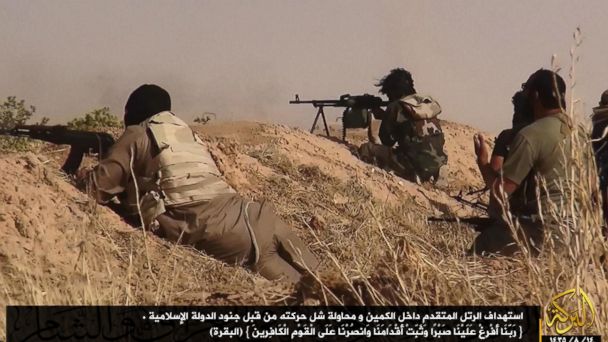Syrian War Planes Strike ISIS Targets in Iraq, US Says

: A photograph made available on June 17, 2014 by the jihadist affiliated group Albaraka News via their twitter account allegedly shows fighters from the Islamic movement ISIS aiming at advancing Iraqi troops at an undisclosed location near the border between Syria and Iraq, 12 June 2014. ALBARAKA NEWS/EPA
Military aircraft that conducted air strikes against ISIS military targets in western Iraq are believed to have been from Syria's air force, a U.S. official told ABC News.
Such air strikes would be a regional escalation of the conflict inside Iraq where the Islamic militants have taken over cities in northern and western Iraq and threatened the stability of the Iraqi government.
It would also make Syria the second country that has been hostile to the U.S. apparently helping Iraq. There have been reports of Iranian troops intervening on behalf of the beleaguered Iraqi government.
ISIS fighters operate on both sides of the Syrian and Iraqi border. Syrian airstrikes would indicate that the government of Syrian President Bashar al Assad finds it advantageous in supporting the beleaguered government of Iraqi Prime Minister Nouri al Maliki.
Terrorists Team Up in Syria to Build Next Generation of Bombs
Iraqi Military Out of Hellfires in Battle Against ISIS
According to the U.S. official, the United States has "pretty good information that the Syrians are behind the fighter aircraft bombing in western Al Anbar," a province in Iraq that includes the Syrian border. The official said the United States is still trying to gather more information that Syria was behind the strikes.
It's not clear where the jets attacked, but over the weekend ISIS fighters took control of al Qaim and Rutba, both cities located near the Iraq-Syrian border.
A U.S. official also said it was not clear whether the Iraqi government requested or authorized Syrian air strikes in Iraqi territory.
Reports from Iraqi news outlets said U.S. air strikes had hit ISIS fighters, prompting the Pentagon to deny that it had launched air strikes. "Press reports that U.S. drones struck ISIL [ISIS] targets in Iraq today are false. No such action has been taken," said Pentagon Press Secretary Rear Admiral John Kirby.
Since the escalation of the fighting in Iraq the United States military has been flying manned and unmanned surveillance flights over Iraq to share information about ISIS targets with the Iraqi government. A Pentagon spokesman said today that the U.S. is now flying between 30 and 35 surveillance flights daily over Iraq.
The Obama administration considered airstrikes inside Iraq to stop the momentum of ISIS advances in northern Iraq, but so far has opted not to do so because it would appear that it was taking sides in the conflict. ISIS is an Sunni Muslim force augmented by the Sunni tribes in northern and western Iraq, while the Iraqi government and its army is overwhelmingly composed of Shiite Muslims.
Instead President Obama announced last week that he had authorized sending up to 300 military advisers to Iraq to assist the Iraqi military in its fight with ISIS.
Kirby announced today that 90 advisers had arrived in Baghdad to establish a Joint Operations Center in Baghdad. They will join two initial teams crafted from 40 military personnel working at the U.S. embassy in Baghdad. In coming days an additional four teams of 50 people will flow into Iraq from elsewhere in the U.S. Central Command area of responsibility.
Kirby stressed that the first mission for the teams would be to conduct assessments to help determine what advisory assistance they will provide in the next phase of their mission. They won't be providing those assessments to their chain of command for another two to three weeks. Kirby said the assessments include assessing the cohesiveness and readiness of Iraqi Security Forces, the state of situation on the ground and ISIS activities, and providing recommendations about the advisory mission.
A U.S. intelligence official provided an assessment that there are between 3,000 and 5,000 ISIS fighters. Their numbers have swelled in recent weeks following the release of almost 1,500 prisoners from a prison in Mosul.
A senior intelligence official said there are approximately 10,000 ISIS fighters - roughly 7,000 in Syria and 3,000 in Iraq. There are between 3,000 and 5,000 foreign fighters who have been incorporated into ISIS ranks, making up part of that 10,000.
It is difficult to assess how many of the roughly 3,000 in Iraq are foreign fighters.